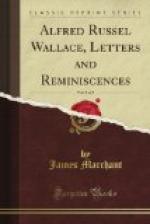At any rate we are in agreement as to Natural Selection being capable of explaining evolution “from amoeba to man.”
It is generally admitted that that is a mechanical or scientific explanation. That is to say, it invokes nothing but intelligible actions and causes.
De Vries, however, asserts that the Darwinian theory is not scientific at all, and that is of course a position he has a right to take up.
But if we admit that it is scientific, then we are precluded from admitting a “directive power.”
This was von Baer’s position, also that of Kant and of Weismann.
But von Baer remarks that the naturalist is not precluded from asking “whether the totality of details leads him to a general and final basis of intentional design.” I have no objection to this, and offer it as an olive-branch which you can throw to your howling and sneering critics.
As to “structures organised to serve certain definite purposes,” surely they offer no more difficulty as regards “scientific” explanation than the apparatus by which an orchid is fertilised.
We can work back to the amoeba to find ourselves face to face with a scarcely organised mass of protoplasm. And then we find ourselves face to face with a problem which will, perhaps, for ever remain insoluble scientifically. But as for that, so is the primeval material of which it (protoplasm) is composed. “Matter” itself is evaporating, for it is being resolved by physical research into something which is intangible.
We cannot form the slightest idea how protoplasm came into existence. It is impossible to regard it as a mere substance. It is a mechanism. Although the chemist may hope to make eventually all the substances which protoplasm fabricates, and will probably do so, he can only build them up by the most complicated processes. Protoplasm appears to be able to manufacture them straight off in a way of which the chemist cannot form the slightest conception. This is one aspect of the mystery of life. Herbert Spencer’s definition tells one nothing.
Science can only explain nature as it reveals itself to the senses in terms of consciousness. The explanation may be all wrong in the eyes of omniscience. All one can say is that it is a practical working basis, and is good enough for mundane purposes. But if I am asked if I can solve the riddle of the Universe I can only answer, No. Brunetiere then retorts that science is bankrupt. But this is equivocal. It only means that it cannot meet demands beyond its power to satisfy.
I entirely sympathise with anyone who seeks an answer from some other non-scientific source. But I keep scientific explanations and spiritual craving wholly distinct.
The whole point of evolution, as formulated by Lyell and Darwin, is to explain phenomena by known causes. Now, directive power is not a known cause. Determinism compels me to believe that every event is inevitable. If we admit a directive power, the order of nature becomes capricious and unintelligible. Excuse my saying all this. But that is the dilemma as it presents itself to my mind. If it does not trouble other people, I can only say, so much the better for them. Briefly, I am afraid I must say that it is ultra-scientific. I think that would have been pretty much Darwin’s view.




